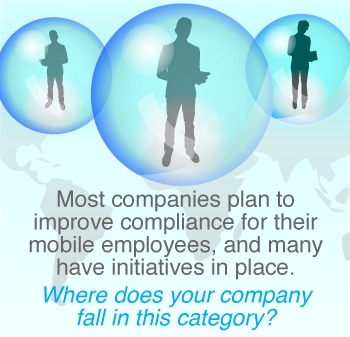 Do you know where your employees are?
Do you know where your employees are?
A mobile employee is one who works in more than one tax jurisdiction. Historically, companies have not tracked their mobile employees other than their formal international assignees. The difficulty lies in administrative issues such as the lack of tracking or timekeeping software sophisticated enough to track the traveling domestic worker. However, enforcement of tax requirements by government authorities has become prevalent.
Many tax jurisdictions, including U.S. states such as New York and California as well as countries such as the U.K. and Germany, are focusing on the enforcement of withholding and reporting requirements for mobile employees. Therefore, companies are reassessing the way they track and allocate income for equity awards provided to mobile employees.
The IRS defines equity-based compensation as any compensation paid to an employee, director, or independent contractor that is based on the value of specified stock (generally, the stock of the employer, which may be a corporation or a partnership). Base salary, bonuses, commissions, incentive stock options (ISOs), non-qualified stock options (NSOs), restricted stock units (RSUs), and employee stock purchase plans (ESPPs) are all income types that may be subject to allocation among multiple jurisdictions.
Mobile employees may hold equity awards that have been granted in one tax jurisdiction, but the employee worked in another tax jurisdiction prior to the time when the equity award vests or is exercised. Rules in tax jurisdictions regarding the taxation of equity awards vary. The awards may be taxed at grant, vest, exercise, sale, or at the point that an employee permanently leaves that location. When an employee works in more than one tax jurisdiction during the period the equity award is outstanding, each jurisdiction may have the right to tax the employee on the income from the equity award. As a result, the employee may pay tax in more than one location. In many cases, both locations (e.g., the state the employee moved from and the state the employee moved to) will tax all or part of the income related to the award.
The same can occur on an international basis and for other types of compensation. A year-end bonus, for example, may be reported to the employee’s resident state and taxed in that state. If the employee has traveled to three different states throughout the year, performing services as that bonus was earned, those states may also lay claim to a prorated portion of the bonus income as well. In addition, this may occur on a global basis as well.
Survey of Compliance Practices
During March 2019, Rutlen Associates undertook a survey to assess compliance practices of companies for their mobile employee populations. The majority of the survey respondents have an employee population of more than 1,000 employees, with one-third of the respondents having a global population of more than 10,000 employees.
Respondents were asked whether they allocated income between tax jurisdictions when complying with the payroll reporting and withholding requirements for mobile employees. The results showed that 30% allocated income for their executives, while about 20% allocated the income for their sales staff. More than 50% of respondents stated that they allocate income for workers who transfer between states, but that number decreased to 30% for workers who traveled in the United States from state to state. This greatest compliance with income allocation occurred with global assignments and transfers, where 80% of the companies surveyed stated that they allocated income between countries.
Types of Income Being Allocated
The survey further broke down which types of income are allocated. For state-to-state mobile employees, their base salary was most often allocated, and RSUs were a close second. For globally mobile employees, it was the reverse. RSUs were allocated the most frequently, with base pay being the runner-up. Stock options and ESPP gains were the least allocated for both state-to-state mobile employees and globally mobile employees. For NSOs, fewer than 20% of respondents allocated income for state-to-state mobile employees, while almost 60% of respondents did so for globally mobile employees.
The survey also revealed that most companies apply a de minimis limit to business traveler income allocations. This is applied for the state-to-state travel population. For most state mobility, de minimis was based on the number of days worked. More than 60% of respondents utilized a number-of-days approach to the application of a de minimis for allocation purposes. The remaining respondents who allocated did so based on the income amount.
For non-U.S. taxes for mobile employees, 37% of respondents used the maximum tax rate for withholding on equity compensation. Close to 40% of respondents also stated that their stock administration system calculated the applicable withholdings for equity compensation for mobile employees.
Estimated Compliance for Total Employees
As a final step, the respondents were asked to estimate their level of compliance across their entire employee population. The majority of respondents, approximately 60% of those who provided an estimate, indicated that they are compliant with more than 50% of their mobile population. Also, 85% of respondents state that they have plans to improve compliance over time, with more than 45% of respondents stating that they have current initiatives to improve compliance.
The survey displayed the fact that companies continue to be more compliant for globally mobile employees than U.S. domestically mobile employees. Payroll compliance is also higher for income of assignees and transfers than for income of business travelers.
Most companies plan to improve compliance for their mobile employees, and many have initiatives in place. Where does your company fall in these categories? Have you addressed your traveling workforce and the income it receives?
Do you like our content? Join the GPMI community to get free education and articles straight to your inbox!

Marlene Zobayanis a partner at Rutlen Associates LLC. She has more than 20 years of international tax and benefits experience including global equity plans, mobile employee taxation, global compensation, and benefits. She provides a range of services to her clients, including global equity plan design, tax reviews and optimization, assistance with local approvals and filings, communications, and designing administrative processes, and is known for her expertise with mobile employee issues.

Mindy Mayo, CPP, is Principal at Ryan, LLC, San Jose office. Mayo specializes in leading and advising organizations in the areas of human capital taxation, including financial and operational risk management, process improvement, and strategic management. She is skilled at representing clients before U.S. state and federal agencies during employment tax audits or controversy. Mayo is an accomplished public speaker and has achieved broad industry recognition for strategic thought leadership on various human capital taxation matters.